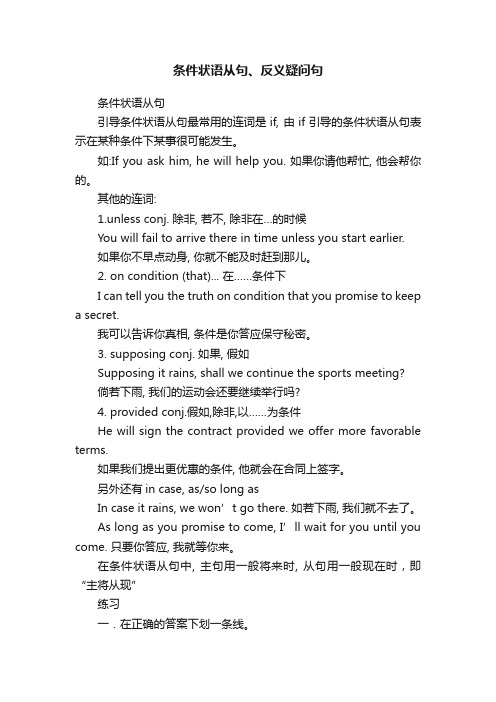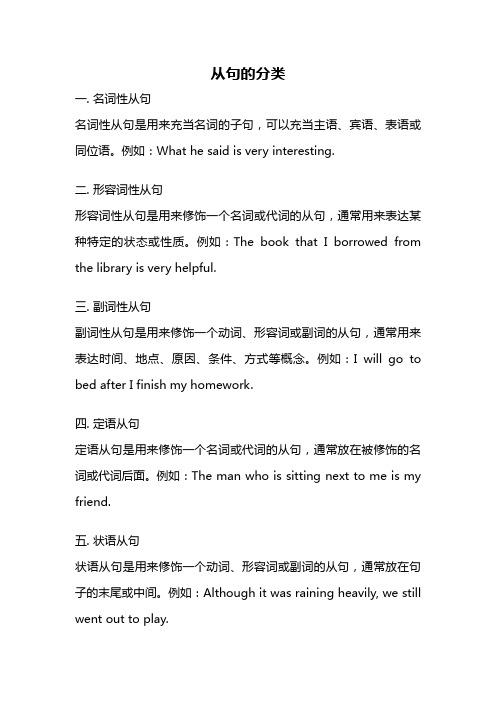条件状语从句、反义疑问句
第07练 反义疑问句(解析版)2023年【暑假分层作业】高一英语(人教版2019)

第07练反义疑问句反义疑问句即附加疑问句。
它表示提问人的看法,没有把握,需要对方证实。
它表示提问人的看法,没有把握,需要对方证实。
反义疑问句由两部分组成:前一部分是一个陈述句,后一部分是一个简短的疑问句,两部分的人称时态应保持一致。
1、陈述部分肯定式+疑问部分否定式2、陈述部分否定式+疑问部分肯定式They work hare,don’t they?She was ill yesterday,wasn’t she?You didn’t go,did you?He can’t ride a bike,can he?请注意以下句型的反义疑问句的用法:1、当陈述部分的主语是I,everyone,everything,nobody时,后面的疑问句应表示为:I am a student, aren’t IEveryone is in the classroom,aren’t they?Everything begins to grow in spring,doesn’t it?Nobody will go,will they?2.当陈述部分有never,seldom,hardly,few,little,barely,scarcely,nothing等否定词时,后面的疑问句则表示为:There are few apples in the basket,are there?He can hardly swim,can he?They seldom come late,do they?3.当陈述部分是I think加从句时,疑问句应和从句的人称时态保持一致。
I think chickens can swim, can’t they?I think Lucy is a good girl,isn’t she?I didn't think he was happy,was he?4.陈述部分有had better时,疑问句应用hadn’t开头:you’d better get up early,hadn’t you?5.当陈述部分是祈使句时,疑问句要根据语气来表达Let’s go out for a walk,shall we?Let us go our for a walk,will you?Turn on the radio,will you?6.反义疑问句的回答用yes,no,但是,当陈述部分是否定形式时,回答要按事实。
条件状语从句、反义疑问句

条件状语从句、反义疑问句条件状语从句引导条件状语从句最常用的连词是if, 由if引导的条件状语从句表示在某种条件下某事很可能发生。
如:If you ask him, he will help you. 如果你请他帮忙, 他会帮你的。
其他的连词:1.unless conj. 除非, 若不, 除非在…的时候You will fail to arrive there in time unless you start earlier.如果你不早点动身, 你就不能及时赶到那儿。
2. on condition (that)... 在……条件下I can tell you the truth on condition that you promise to keepa secret.我可以告诉你真相, 条件是你答应保守秘密。
3. supposing conj. 如果, 假如Supposing it rains, shall we continue the sports meeting?倘若下雨, 我们的运动会还要继续举行吗?4. provided conj.假如,除非,以……为条件He will sign the contract provided we offer more favorable terms.如果我们提出更优惠的条件, 他就会在合同上签字。
另外还有in case, as/so long asIn case it rains, we won’t go there. 如若下雨, 我们就不去了。
As long as you promise to come, I’ll wait for you until you come. 只要你答应, 我就等你来。
在条件状语从句中, 主句用一般将来时, 从句用一般现在时,即“主将从现”练习一.在正确的答案下划一条线。
1.Daina ( will go/go/goes) to Europe if she (will pass/pass/passes) the exams .2. The graduates (will teach/teach/teaches) in the poor village if the Ministry of Education (will agree/ agree/agrees) soon.3. If there (will be/ are/is) a car accident, they (will call/call/calls) 110 for help at once.4. If it (won’t/don’t/doesn’t/ isn’t) rainy, we (will take/ take/takes) walk outside.5. If a UFO (will land/land/lands) in front of me, I (will go/go/goes) in to look for the alien.二、用所给词的适当形式填空1.If you ________(feel) tired, you _______________ (have) to havea rest.2. Where _______ he _________(see) the film if he ________________(have) time?3. If there __________(be) fewer trees, there _______________( be) more pollution.4. He _____________(dress) more casually if he ________________( not work) on weekends.5. If Marcia _____________(live) alone, she ___________________( keep) a pet parrot.三、翻译句子15.如果他到的晚了会发生什么事情?What _______________ if he _____________ late?16. 如果努力学习,你就会取得好成绩。
反义疑问句

反意疑问句。
1、什么是反意疑问句英语中,反意疑问句是由陈述句和附在其后的附加疑问句组成。
反意疑问句有四种类型:(1)肯定陈述+否定简短问句;(2)否定陈述+肯定简短问句;(3)肯定陈述+肯定简短问句;(4)否定陈述+否定简短问句。
其中,前两种运用最为广泛。
除此之外,反意疑问句还有“祈使句+简短问句”的形式,这种用法通常用于减弱祈使语气。
如: Carry this parcel for me, can you? 给我拿一下包,好吗?陈述部分含“too...to”时,是否定句2.反意疑问句的结构:陈述句(主语+谓语……),+助动词/情态动词/be动词+主语(代词形式);陈述句部分如果是肯定句,反意疑问句,疑问句部分的助动词/情态动词/be动词+n ot (否定提问);如果陈述句部分是否定句,反意疑问句,疑问句部分用肯定式提问。
用法说明1.陈述句中是I am时,简短问句则用aren’t I。
I am an excellent English speaker, aren’t I?I am late, aren’t I ?I'm as tall as your sister,aren't I?(我和你姐姐一样高,对吗?)2. 陈述部分的主语是I , 附加疑问句的部分的主语用you,以表示征询对方的意见,这时等于另外的一个句子,相当于how/what about you ?what do you think ?I like living in the country, don’t you?= I like living in the country, how about you?I found English interesting, don‘t you?= I found English interesting, what do think?3.陈述句中是非限定人称代词one时,正式文体中,简短问句的主语为one,而非正式文体中用you。
条件状语从句的四种类型解析

条件状语从句的四种类型解析条件状语从句是英语语法中常见的一种从句类型,用于表示一个条件或假设。
它可以通过四种不同的方式来表达,在文章中起着重要的作用。
本文将对这四种类型进行详细解析。
第一种类型:真实条件状语从句真实条件状语从句用来表示一个可能发生的条件和其结果。
它的结构是“if + 陈述句,陈述句”。
该类型的状语从句使用的是一种常见、普遍的条件句结构。
例如:If it rains, we will stay at home.(如果下雨,我们会呆在家里。
)If I have time, I will go to the library.(如果我有时间,我会去图书馆。
)这种类型的状语从句所表达的条件通常是可能实现的,所以它与现实情况相符。
第二种类型:虚拟条件状语从句虚拟条件状语从句用来表示一个假设性的条件和其结果。
它的结构是“if + 过去式,would/could/might + 动词原形”。
该类型的状语从句常用于表达不太可能实现的条件。
例如:If I were rich, I would travel around the world.(如果我富有,我会周游世界。
)If he had studied harder, he could have passed the exam.(如果他努力学习,他本可以通过考试。
)在这种类型的状语从句中,主句通常包含一个虚拟语气的动词,表示对现实情况的一种想象或假设。
第三种类型:反过来的条件状语从句反过来的条件状语从句用来表示一个反向的条件和其结果。
它的结构是“had/should + 陈述句,would/could/might + 动词原形”。
该类型的状语从句常用于反向的条件假设。
例如:Had it not been for your help, I would have failed.(如果不是你的帮助,我就会失败。
)Should you need any assistance, feel free to contact me.(如果你需要任何帮助,随时联系我。
从句的分类

从句的分类一. 名词性从句名词性从句是用来充当名词的子句,可以充当主语、宾语、表语或同位语。
例如:What he said is very interesting.二. 形容词性从句形容词性从句是用来修饰一个名词或代词的从句,通常用来表达某种特定的状态或性质。
例如:The book that I borrowed from the library is very helpful.三. 副词性从句副词性从句是用来修饰一个动词、形容词或副词的从句,通常用来表达时间、地点、原因、条件、方式等概念。
例如:I will go to bed after I finish my homework.四. 定语从句定语从句是用来修饰一个名词或代词的从句,通常放在被修饰的名词或代词后面。
例如:The man who is sitting next to me is my friend.五. 状语从句状语从句是用来修饰一个动词、形容词或副词的从句,通常放在句子的末尾或中间。
例如:Although it was raining heavily, we still went out to play.六. 同位语从句同位语从句是用来解释或说明某个名词或代词的从句,通常放在被解释或说明的名词或代词后面,用逗号或冒号隔开。
例如:My dream, that I can travel around the world, is very beautiful.七. 反义疑问句反义疑问句是由一个陈述句和一个反问句组成的句子,用来表示询问者对所说的话是否正确或期望得到回答。
例如:You can speak English, can't you?八. 倒装句倒装句是将主语和谓语的位置颠倒过来的句子,通常用来表示强调或判断。
例如:Never have I seen such a beautiful sunset.九. 感叹句感叹句是用来表达强烈情感或感叹的句子,通常用来表示惊讶、喜悦、悲伤等情感。
总结好的:if引导的条件状语从句

if引导的条件状语从句if1) 用法:(1)条件状语从句通常由连词if引导,意为“如果、假如”,主句不能用be going to表示将来,而应该用shall,will。
If you leave now, you are never going to regret it. (错误)If you leave now, you will never regret it. (正确)(2)if “如果”,引导条件状语从句,主句用一般将来时,从句则用一般现在时,如:If it rains tomorrow, I shan’t climb the hills.(3)另外,主句是祈使句或含有情态动词,从句也用一般现在时。
如:Please call me if he comes next Sunday.Can you call the policeman if you are in the trouble.注意宾语从句中的if与条件状语从句if的区别。
宾语从句中的if“是否”相当于whether,引导宾语从句,时态需根据语境确定。
如果主句用一般现在时,从句可以根据具体情况选用时态,如果主句用一般过去时,从句必须用过去式的某种形式。
I don't know if it will rain tomorrow. 我不知道明天是否会下雨。
Our teacher said there was going to be a football match the next month.我们说下月将有场足球比赛。
【边学边做】用括号内所给词的正确形式填空。
1. What will you buy if you ________(have)a lot of money?2. If it ________(not snow)tomorrow, we will feel unhappy.3. You mustn’t go to school if you ________(be)still in bed.4. If he _______(be)at home at that time, he would know it.5. Please show me the way if you ________(know)it.6. You will hurt your teeth if you ________(eat)too much candy.7. If you gave me a toy car, I _________(be)very happy.8. I would get the prize if I _________(work)hard.9.If she ______ (finish ) work early ,she ______(go) home.10.If the weather______(be)fine,we_______(go)for a walk .11. If I_____(have) time tonight ,I _______(finish) the book I’m reading.12. If it ______(rain) next weekend , we_______(not be able to ) plant the vegetable .13. If it_______(rain),we______(stay) at home .14.If she______(arrive) ,she _____(phone) me .15. If he_____(call),tell him I’ll ring back .二、用所给词的适当形式填空1. If you ________(feel) tired, you _________ (have) to have a rest.2. Where _____ he ____(see) the film if he _________(have) time?3. If there ____ (be) fewer trees, there _______ (be) more pollution.4. He ___ (dress) more casually if he ___ (not work) on weekends.5. If Marcia _______ (live) alone, she _______ (keep) a pet parrot.6. Lana _____ (buy) a new dress if the old one ____ (be) out of style.7. The twins _______ (fight) if they__________ (argue).8. I ______ (have) a bake sale if I ____ (need) money for education.9. Peter ____ (send) me a beautiful souvenir if he ____(tour) Spain.10. If Mr. Green _______ (say) I am hard- working, my parents ___ (feel) glad.11. I ______ (go) to the beach if it________ (not rain) this week.12. _____they ___ (have) a match if the P.E. teacher __ (be) busy?13. He ____ (write) a letter to his grandparents if he ____ (get) his report card this week.14. If she ______ (get) up late, she _____ (not catch) the early bus.15. Peter ____ (major) in English if he ____(pass) the exams in Peking University.二、完成句子1. 他如果看电视太久了,他的父母会不高兴。
词汇与语法 第7讲(从句-反义疑问句)

从句归纳
►
► 1.
2.
3.
从句是指从属于主句的句子,由从属连词引 导,充当句子的某个成分,如主语,宾语, 表语,同位语,定语,状语等。 根据在句子中的不同作用,从句可分为: 名词性从句(包括主语从句,宾语从句,表 语从句和同位语从句) 形容词性从句(即定语从句) 副词性从句(即状语从句)
真题回顾
► Many
of the people refused to answer any questions. (学位真题2008年6月) ► A. question B. questioned ► C. questioning D. were questioned ► 答案:B ► 解析:考察过去分词做定语。
The order when we should return hasn’t reached us. 我们什么时候该返回的命令还未到 。 (order与从句没有逻辑关系) The day when New China was founded will never be forgotten. 新中国成立的那天永远不会被忘记。 (the day在从句中作状语)
真题回顾 ____life could be found on Mars was once believed by scientists. (学位真题2008年6月) ► A. What B. As ► C. That D. While ► 答案:C ► 解析:考察主语从句的理解。
► ► Contact
It is still a question when we shall have our sports meet.
常见的用it作形式主语的复合句结构: 1)It is + 名词+ that 从句 It is a fact (a shame, a pity, no wonder, good news, …) that … 2)It is + 形容词+ that 从句 It is necessary (strange, important, wonderful, possible, likely, …) that (虚拟) 3) It is+过去分词+that 从句 It is said (reported, decided, …) +that 从句
条件状语从句的引导词及句型转换

条件状语从句的引导词及句型转换条件状语从句是英语中常用的一种从句结构,用来表示条件、原因、目的等。
在条件状语从句中,引导词起着引导句子结构的作用,而句型转换则可以使表达更加灵活多样。
本文将介绍条件状语从句的常见引导词及句型转换方法。
一、条件状语从句的引导词常见的条件状语从句引导词有:if, whether, unless, provided (that), as long as等。
1. IfIf是条件状语从句的最常见引导词,表示“如果”,可用来引导真实条件状语从句与虚拟条件状语从句。
例如:- If it rains tomorrow, we will stay at home.- If I were you, I would take the job.2. WhetherWhether是用来引导陈述句的间接疑问句,表示“是否”。
例如:- I don't know whether he will come to the party or not.3. UnlessUnless表示“除非”,相当于if...not,引导否定条件状语从句。
例如:- You will fail the exam unless you study hard.4. Provided (that)Provided (that)表示“只要”,相当于as long as。
例如:- You can go out to play provided (that) you finish your homework.二、条件状语从句的句型转换条件状语从句可以通过句型转换来增加语言表达的多样性。
1. 将条件状语从句改为条件状语从句的省略句当主句与条件从句的主语和谓语相同时,可以将从句中的主语和be 动词省略。
例如:- If you come late, you will miss the train.变为:Come late, you will miss the train.2. 将条件状语从句改为条件状语从句的倒装句当主句与条件从句中的某些状语或状语修饰语倒装时,可以将条件从句改为倒装句。
- 1、下载文档前请自行甄别文档内容的完整性,平台不提供额外的编辑、内容补充、找答案等附加服务。
- 2、"仅部分预览"的文档,不可在线预览部分如存在完整性等问题,可反馈申请退款(可完整预览的文档不适用该条件!)。
- 3、如文档侵犯您的权益,请联系客服反馈,我们会尽快为您处理(人工客服工作时间:9:00-18:30)。
条件状语从句引导条件状语从句最常用的连词是if, 由if引导的条件状语从句表示在某种条件下某事很可能发生。
如:If you ask him, he will help you. 如果你请他帮忙, 他会帮你的。
其他的连词:1.unless conj. 除非, 若不, 除非在…的时候You will fail to arrive there in time unless you start earlier.如果你不早点动身, 你就不能及时赶到那儿。
2. on condition (that)... 在……条件下I can tell you the truth on condition that you promise to keep a secret.我可以告诉你真相, 条件是你答应保守秘密。
3. supposing conj. 如果, 假如Supposing it rains, shall we continue the sports meeting?倘若下雨, 我们的运动会还要继续举行吗?4. provided conj.假如,除非,以……为条件He will sign the contract provided we offer more favorable terms.如果我们提出更优惠的条件, 他就会在合同上签字。
另外还有in case, as/so long asIn case it rains, we won’t go there. 如若下雨, 我们就不去了。
As long as you promise to come, I’ll wait for you until you come. 只要你答应, 我就等你来。
在条件状语从句中, 主句用一般将来时, 从句用一般现在时,即“主将从现”练习一.在正确的答案下划一条线。
1.Daina ( will go/go/goes) to Europe if she (will pass/pass/passes) the exams .2. The graduates (will teach/teach/teaches) in the poor village if the Ministry of Education (will agree/ agree/agrees) soon.3. If there (will be/ are/is) a car accident, they (will call/call/calls) 110 for help at once.4. If it (won’t/don’t/doesn’t/ isn’t) rainy, we (will take/ take/takes) walk outside.5. If a UFO (will land/land/lands) in front of me, I (will go/go/goes) in to look for the alien.二、用所给词的适当形式填空1.If you ________(feel) tired, you _______________ (have) to have a rest.2. Where _______ he _________(see) the film if he ________________(have) time?3. If there __________(be) fewer trees, there _______________( be) more pollution.4. He _____________(dress) more casually if he ________________( not work) on weekends.5. If Marcia _____________(live) alone, she ___________________( keep) a pet parrot.三、翻译句子15.如果他到的晚了会发生什么事情?What _______________ if he _____________ late?16. 如果努力学习,你就会取得好成绩。
If you_____ _____, you _____ good ________.17. 他如果看电视太久了,他的父母会不高兴。
If he _ ___ TV too much, his parents __ _ ___ unhappy.18. 如果我们为他组织生日聚会,大家都会来的。
Everyone ___________________ if we _____________ a birthday party __________ him.19. 如果明天不下雨,我会和你一起去公园的。
If it ____ tomorrow, I___ go to the park ___ you.反意疑问句反义疑问句即附加疑问句。
它表示提问人的看法,没有把握,需要对方证实。
反义疑问句由两部分组成:前一部分是一个陈述句,后一部分是一个简短的疑问句,两部分的人称时态应保持一致。
陈述部分肯定式+疑问部分否定式(前肯后否)陈述部分否定式+疑问部分肯定式(前否后肯)请注意以下句型的反义疑问句的用法:1、当陈述部分的主语是everybody, everyone, someone, nobody, no one, somebody等合成代词时,附加疑问句中的主语通常用they。
但亦可用he,尤其是nobody, no one等作主语,具有否定概念时。
如:Somebody phoned while I was out, didn’t they?2、当陈述部分的主语是不定代词everything, nothing, anything, something时,附加疑问句中的主语一般用it,不用they。
如:Everything seems all right now, doesn’t it?3、当陈述部分的主语是指示代词this, that或these, those时,附加疑问句中的主语分别用it和they。
如:This is important, isn’t it? / These are your friends Tom and Jack, aren’t they?4、当陈述句为there be结构时,附加疑问句用be there。
如:There’s no help for it, is there? / There’s something wrong, isn’t there?5、陈述部分带有seldom, hardly, never, rarely, few, little, nowhere, nothing等否定词或半否定词时,附加疑问部分的动词用肯定形式。
如:Bob rarely got drunk, did he? / Few people know him, do they?6、在由“祈使句+附加疑问”构成的附加疑问句中,附加疑问部分一般用will you, won’t you。
如:Don’t open the door, will you? / Give me some cigarettes, won’t you?但是,以let’s开头的祈使句,附加疑问部分用shall we;以let us开头的祈使句,疑问部分用will you。
如:Let’s have a basketball match this afternoon, shall we?Let us go out for a rest, will you?7、当陈述部分含有情态动词used to时,疑问部分可用usedn’t或didn’t。
如:The old man used to smoke, didn’t he?或usedn’t he?8、当陈述部分的主语是I,谓语是think, believe, suppose, expect这类动词时,附加疑问部分则往往与从句中的主语和谓语动词保持对应关系。
I suppose that he’s serious,isn’t he? I don’t think she cares, does she?巩固练习:1. I don’t think that the necklace is made of diamond, ________?A. do IB. do youC. isn’t itD. is it2. His wife had the carpets and the curtains cleaned, ________?A. hadn’tB. hadC. didn’t sheD. did she3. No one left here yesterday,________?A. didn’t theyB. did theyC. didn’t oneD. did one4. Birds rarely build nests in our garden,________?A. don’t theyB. do theyC. didn’t theyD. did they5. You must have been to the Great Wall,____________?A. mustn’t youB. haven’t youC. aren’t youD. must you6. learning how to repair motors takes a long time,________?A. doesn’t itB. don’t theyC. does itD. do they7.They must have stayed at home last night,________?A. mustn’t theyB. haven’t theyC. didn’t theyD. must they8.Let’s start out early tomorrow morning,________?A. shall weB. will youC. do youD. can’t you9.There’s not much news in today’s newspaper,________?A. isn’t itB. is itC. isn’t thereD. is there10.She’s been a worker here for many years,________?A. isn’t sheB. is sheC. hasn’t sheD. has she11.What beautiful flowers,________?A. aren’t theyB. are theyC. isn’t itD. is it12.Mother used to live in a poor village,____________?A. used sheB. usedn’t sheC. didn’t heD. did he。
